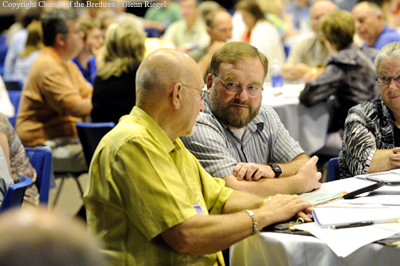 |
| Photo by Glenn Riegel |
| Delegates engage in table talk during discussion of revisions to the Ministerial Leadership polity document. The ministerial leadership polity will be a study document for a year before coming back to the 2013 Conference for consideration. |
Delegates engaged in a first reading of a proposed revision of the denomination’s ministerial leadership polity, paving the way for a year of study and potential approval at the 2013 Annual Conference. If approved, the new polity would replace previous ministry polity documents and be implemented beginning January 1, 2014.
Ministry Office director Mary Jo Flory-Steury, who also serves as associate general secretary, has shepherded the paper throughout its development. She explained that the seed for the polity revisions was planted at a 2007 Ministerial Leadership Conference and initial drafting began in 2009. Various stakeholders in the church received multiple opportunities to shape the paper along the way.
For the past century, said Flory-Steury, the church has made significant changes in ministerial leadership polity about once per decade. The last such revision came 13 years ago, in 1999, and changing times again necessitate re-examining polity to ensure standard calling and credentialing processes across the denomination that serve ministerial leaders and the church well.
Flory-Steury, with assistance from other members of the team that drafted the paper, walked delegates through key concepts and goals of the document. It begins with a preamble that explains why changes are needed; moves to an introduction that affirms the Brethren commitment to the priesthood of all believers and how the calling of set-apart leaders takes place within the context of a church that believes every member is called to ministry; and then includes a significant section on the history and theology of ordination in the Church of the Brethren.
Perhaps the most noticeable polity change is that the familiar language of “licensed minister” and “ordained minister” would be altered. In the new polity, a person discerning a call to ministry is assisted by an accountability and support group termed a “Calling Cohort” to flesh out the call and develop a “Covenant of Accountability” to guide a process of preparation. Once approved by congregation and district, the applicant becomes an “Inquiring Minister” and moves toward becoming either a “Commissioned Minister” with a specific role in one congregation or an “Ordained Minister,” a role virtually identical to ordained ministry in current polity. Absent from the new polity is the former role of “licensed lay speaker.”
Instead of a hierarchy of ministry, the document speaks of three ministry circles (licensed, commissioned, ordained) designed to “effectively form, equip, and support ministers for a particular sort of ministry within the denomination.”
Guided by two questions provided by the committee, delegates engaged in 10 minutes of “table talk.” Out of the table discussions, about a dozen people posed questions or shared concerns. Representatives from two tables expressed preference for the existing term “licensed minister” over the proposed “inquiring minister,” arguing that the new term would not be understood in circles of ministry beyond congregations (such as hospitals) or that it devalues the role. Other questions were raised about the role of the “calling cohort” and the complexity of the paper.
Flory-Steury noted that while some of the terminology is unfamiliar, many of the concepts are not new and resources have been provided to facilitate deeper understanding of the document. She encouraged congregations to study the paper in the coming year.
In addition to the feedback shared by delegates on the Conference floor, insights recorded by table facilitators during table talk will be forwarded to the Ministry Office. Crafters of the document are Flory-Steury; Dana Cassell; Ministry Advisory Council members Tara Hornbacker and Steve Schweitzer; district executives David Steele, Kevin Kessler, and David Shumate; and Julie Hostetter, representing the Brethren Academy. The paper and additional resources, including a study guide, timeline, and frequently asked questions, can be found at www.brethren.org/mlp .
— Don Fitzkee is a volunteer writer on the Annual Conference news team and a member of the denomination’s Mission and Ministry Board